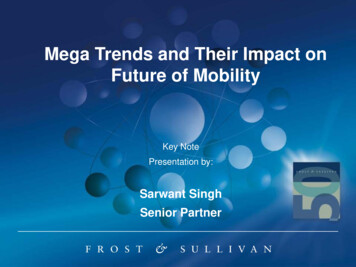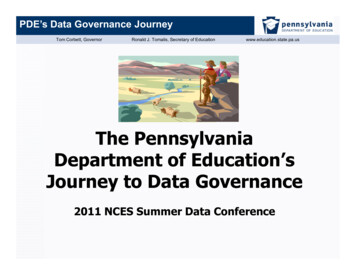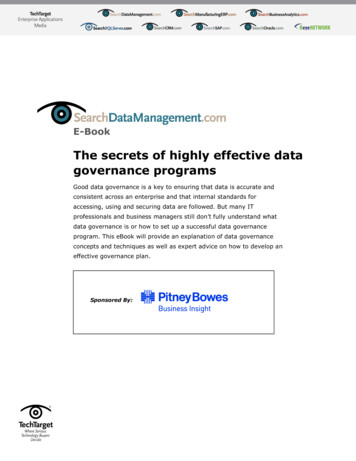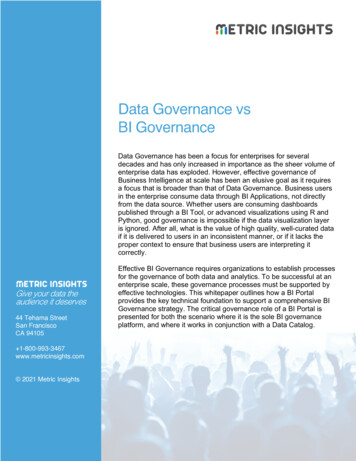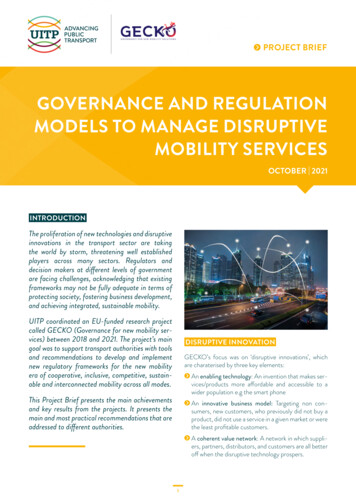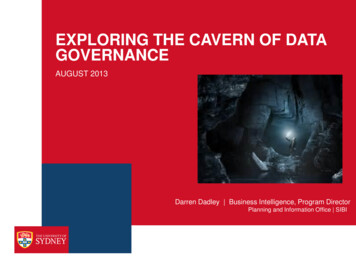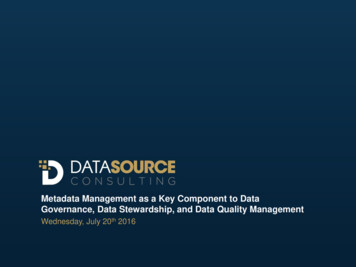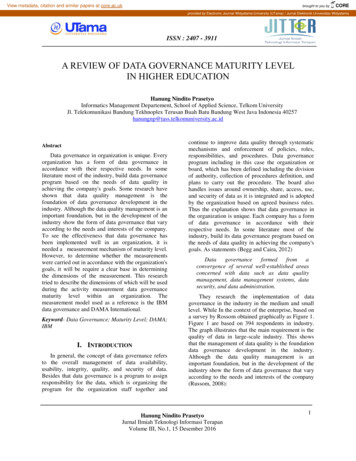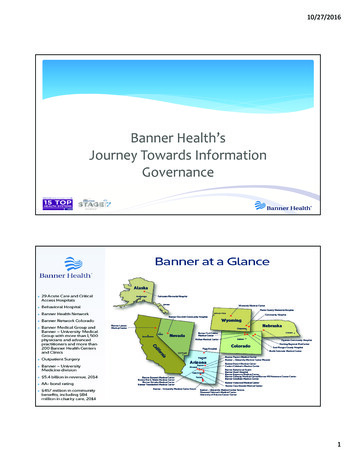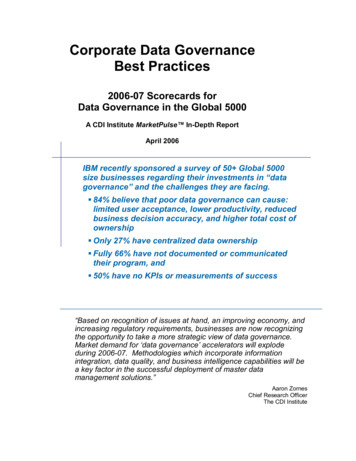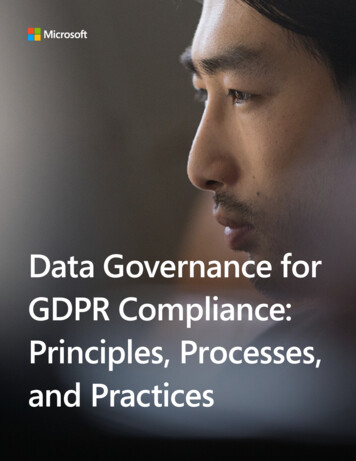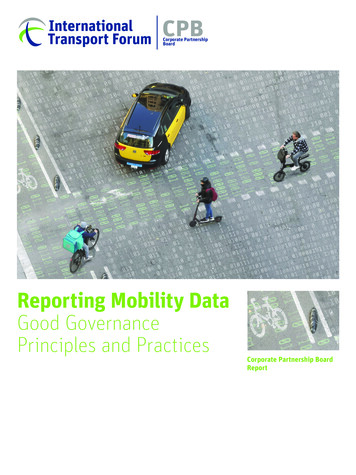
Transcription
CPBCorporate PartnershipBoardReporting Mobility DataGood GovernancePrinciples and PracticesCorporate Partnership BoardReport
Reporting Mobility DataGood GovernancePrinciples and PracticesCorporate Partnership BoardReport
The International Transport ForumThe International Transport Forum is an intergovernmental organisation with 63 member countries. It actsas a think tank for transport policy and organises the Annual Summit of transport ministers. ITF is the onlyglobal body that covers all transport modes. The ITF is politically autonomous and administrativelyintegrated with the OECD.The ITF works for transport policies that improve peoples’ lives. Our mission is to foster a deeperunderstanding of the role of transport in economic growth, environmental sustainability and socialinclusion and to raise the public profile of transport policy.The ITF organises global dialogue for better transport. We act as a platform for discussion and prenegotiation of policy issues across all transport modes. We analyse trends, share knowledge and promoteexchange among transport decision-makers and civil society. The ITF’s Annual Summit is the world’s largestgathering of transport ministers and the leading global platform for dialogue on transport policy.The Members of the Forum are: Albania, Armenia, Argentina, Australia, Austria, Azerbaijan, Belarus,Belgium, Bosnia and Herzegovina, Bulgaria, Canada, Chile, China (People’s Republic of), Colombia, Croatia,Czech Republic, Denmark, Estonia, Finland, France, Georgia, Germany, Greece, Hungary, Iceland, India,Ireland, Israel, Italy, Japan, Kazakhstan, Korea, Latvia, Liechtenstein, Lithuania, Luxembourg, Malta,Mexico, Republic of Moldova, Mongolia, Montenegro, Morocco, the Netherlands, New Zealand,North Macedonia, Norway, Poland, Portugal, Romania, Russian Federation, Serbia, Slovak Republic,Slovenia, Spain, Sweden, Switzerland, Tunisia, Turkey, Ukraine, the United Arab Emirates, theUnited Kingdom, the United States, and Uzbekistan.About the Corporate Partnership BoardThe Corporate Partnership Board (CPB) is the International Transport Forum’s platform for engaging withthe private sector and enriching global transport policy discussion with a business perspective. Themembers of the ITF Corporate Partnership Board are: AB InBev, Airbus, Allianz Partners, Alstom, Aramco,Argo AI, Arrival, AutoCrypt, Bosch, CEIIA, Cruise, ExxonMobil, Iberdrola, Kakaomobility, Michelin, MottMacdonald, NXP, PTV Group, RATP Group, Rolls Royce, Shell, Siemens, SPEA Engineering, TIER Mobility,Total Energies, Toyota, Trucknet, Uber, Valeo, Voi, Volvo Cars and Volvo Group.DisclaimerFunding for this work has been provided by the ITF Corporate Partnership Board. This report is publishedunder the responsibility of the Secretary-General of the ITF. It has not been subject to the scrutiny of ITFor OECD member countries, and does not necessarily reflect their official views or those of the membersof the Corporate Partnership Board.Cite this work as: ITF (2021), “Reporting Mobility Data: Good Governance Principles and Practices”,International Transport Forum Policy Papers, No. 101, OECD Publishing, Paris.
ACKNOWLEDGEMENTSAcknowledgementsThis report was written by Philippe Crist with substantive contributions from Camille Combe, both of theInternational Transport Forum (ITF). The project was managed by Philippe Crist.The work for this report was carried out in the context of a project initiated and funded by the InternationalTransport Forum’s Corporate Partnership Board (CPB). CPB projects are designed to enrich policydiscussion with a business perspective. They are launched in areas where CPB member companies identifyan emerging issue in transport policy or an innovation challenge to the transport system. Led by the ITF,the project development is carried out collaboratively in working groups consisting of CPB membercompanies, external experts and ITF staff.A virtual workshop information sharing and discussion with members of the ITF Corporate PartnershipBoard, including Rem Dekker (Waymo), Jacques Ferriere (RATP), Benoit Marichal (RATP), PauloHumanes (PTV), Uttara Sivaram (Uber), Laurent Tridemy (Michelin) and Mathieu Voisin (RATP). Alsocontributing to the workshop discussions were Diego Canales (Populus), Sebastian Castellanos (NUMO),Jascha Franklin-Hodge (Open Mobility Foundation), Michael Schnuerle (Open Mobility Foundation), KevinWebb (SharedStreets), Rebecca Williams (Belfer Center – Harvard University). Philippe Crist, SharonMasterson, Asuka Ito and Maria Santos Alfageme all participated for ITF.Several external experts were also consulted in the preparation of this report. These included JeanColdefy (ATEC-ITS), Jonathan Couppe (Mairie de Paris), Antoine Courmont (Sciences Po), Laetitia Dablanc(University Gustave Eiffel), Thomas Geier (EMTA), Mélanie Gidel (Mairie de Paris), Anabelle Huet (UITP),Gayang Ho (UITP), Vincent Neumayer (Wiener Linien), Gerald Stöckl (Upstream Mobility).The authors would like to thank Jari Kauppila, Sharon Masterson and Mary Crass (all ITF) for their reviewof a draft version of the report Gemma Nellies (independent) for editorial support and HilaryGaboriau (ITF) for co-ordinating publication.REPORTING MOBILITY DATA: GOOD GOVERNANCE PRINCIPLES AND PRACTICES ITF 20223
TABLE OF CONTENTSTable of contentsExecutive summary . 6Governance, data and data governance . 9Factors to consider when establishing or adapting data-reporting frameworks . 12Data heterogeneity and risks . 20Data semantics, schemas and reporting syntaxes. 32Data semantics. 32Data schemas . 34Data syntaxes . 34Mobility data-reporting principles and framework . 46Data-sharing frameworks and principles . 46Framework guidelines for mobility data reporting . 54Specific actions to support data-reporting initiatives . 58Establishing data protection by design and by default . 62Governance of digital space. 62Updating legal frameworks to establish coherent public value for data governance . 63Building blocks of public value data governance . 65Designing data infrastructure for public value: The public stack . 70References . 73FiguresFigure 1. Two pillars of mobility data governance: Data sharing and data reporting . 13Figure 2. Personal data taxonomy and appropriate de-identification methodologies. 24Figure 3. Risk-assessment matrix . 30Figure 4. Perceived risks associated with data sharing and reporting as identified by membersof the International Association of Public Transport. 31Figure 5. Scope of different European public transport standards . 36Figure 6. Sustainable mobility for all data-sharing policy frameworks . 494REPORTING MOBILITY DATA: GOOD GOVERNANCE PRINCIPLES AND PRACTICES ITF 2022
TABLE OF CONTENTSFigure 7. Actors and roles in MyData-based personal data management . 69Figure 8. MyData in a coherent and privacy-preserving data-governance framework for cities . 70Figure 9. The public stack: Embedding public values into data and technology architecture andinfrastructure . 72TablesTable 1. Trade secrets and commercially sensitive information according to different countries . 27Table 2. Opportunities to leverage General Transit Feed Specification datasets to evaluatetransit system efficiency. 39Table 3. Mobility Data Specification core application programming interfaces. 41BoxesBox 1. Data governance, data reporting and the fundamental human right to privacy. 11Box 2. Public authority data acquisition models identified by the European Investment Bank . 18Box 3. Evolving location data precision . 21Box 4. Privacy-preserving mechanisms . 23Box 5. Open Mobility Foundation guidance on using the Mobility Data Specification under theEuropean Union’s General Data Protection Regulation . 44Box 6. New Urban Mobility Alliance Privacy Principles for Mobility Data . 51Box 7. Setting purposive data collection: The New Urban Mobility Alliance’s “Micromobility & Your City”tool . 56Box 8. SynchroniCity: Implementing Minimum Interoperability Mechanisms . 66REPORTING MOBILITY DATA: GOOD GOVERNANCE PRINCIPLES AND PRACTICES ITF 20225
EXECUTIVE SUMMARYExecutive summaryWhat we didTransport systems and the people using them generate an ever-increasing amount of data. These datarepresent a largely untapped potential source for transport system performance improvement but alsopose significant and often poorly understood risks. Mobility data-governance frameworks are comprisedof two pillars – data sharing and data reporting. Data sharing refers to data shared among market actorsand other stakeholders, which enables the delivery of mobility and other services and which supports thefunctioning of transport markets. Data reporting refers to data provided by stakeholders and market actorsto public authorities that enables the latter to monitor, guide or intervene to enact public policy. Thisreport explores the issues that public authorities must address when establishing data-reporting mandatesand policies.What we foundGood governance often requires access to sensitive or personal data – this is especially evident in the fieldof mobility. These data are increasingly found in the private sector and thus must be collected by publicauthorities. The balance of benefits and harms emerging from government access to data underscores theneed for appropriate and effective data-governance frameworks that recognise, respect and enshrineindividual privacy rights. At the core of these frameworks is the need to reconcile what is technicallypossible, what is desirable and what is legally permitted.Reporting of personal data should adhere to principles that ensure the highest level of privacy protection.Personal data can be linked directly or indirectly to natural persons and therefore poses the mostsignificant risk to potential impacts on privacy rights. The definition of “personal data” should be expansive,given that the risks of re-identification continue to increase over time. Whether data are consideredpersonal does not prevent the collection or reporting of such data but should trigger additional care in itsprocessing and handling.The sharing or release of data deemed to be commercially confidential or sensitive poses another class ofrisks. The commercial sensitivity of informational or operational data depends on the context and natureof collected and reported data. Not all technical or operational data releases will harm competition,although transactional information and other information regarding investments or service developmentare almost always commercially sensitive.Public authorities can reduce both real and perceived data-reporting risks by adopting proportionate andtransparent data-collection and handling protocols that protect personal and commercially sensitive data.Data collection by authorities may be compulsory, for example, by making data reporting conditional toaccessing a service or a set of rights, voluntarily or on commercial terms. Public authorities select dataacquisition pathways depending on the types of public mandates they hold and the policy objectives theyaim to achieve. Governments and firms must consider the relative costs of different data acquisitionpathways, as well as the proportionality and balance of these costs in relation to the expected benefitsfrom such data collection. Public authorities must also consider their technical and human resourcecapacity to materially collect, process and manage data when selecting a data acquisition pathway. Whenmandates for public authorities are clear and well-articulated – for example, the need to ensure high levels6REPORTING MOBILITY DATA: GOOD GOVERNANCE PRINCIPLES AND PRACTICES ITF 2022
EXECUTIVE SUMMARYof road safety or to manage public spaces for the public good – then direct or conditional compulsion ofdata reporting is warranted, provided that the burdens imposed on reporting parties are in line withexpected benefits.Data reported to public authorities enables them to plan, manage transport operations or enforceregulations. For this reason, public authorities often require data reporting from market actors or make ita condition of licensure. The level of detail or aggregation of data required by authorities is linked to thespecific task at hand.Planning data are not principally concerned with where individuals travel but with how communitiesfunction and, therefore, do not need to be highly disaggregated or available in real-time. Operational dataallows authorities to control traffic, manage public spaces and respond to incidents in real-time.Operational data requires greater granularity than planning data but can still be collected and reported atan appropriate level of aggregation. Data supporting enforcement actions relate directly to uniquevehicles, individuals and their specific behaviours. As such, this is the most privacy-sensitive of the threedata-reporting streams.Not everything of consequence for urban mobility produces digital data, which may lead to observationalbiases. Just because a data stream is digital and can easily be collected does not mean it provides anaccurate or useful assessment of the “ground truth”.Data reporting necessarily entails imposing certain burdens on reporting parties. Some form of dataharmonisation can improve regulatory efficiency. In certain instances, data syntaxes encode personal orcommercially sensitive data and thus, reporting requirements that mandate the use of these syntaxes mustbe accompanied by appropriate risk avoidance or mitigation policies.Current practices in data governance are generally unfit for delivering desired policy outcomes – includingthe protection of individuals’ fundamental rights, welfare-improving competition, equity andsustainability. These data-governance frameworks were developed outside the sphere of publicgovernance and not designed to deliver on such outcomes. Unlike public spaces, digital spaces are largelyunregulated, or rather, they are only partially regulated, imperfectly, and with no clear consensus on howand for whom they should be regulated. New governance frameworks are needed in order to govern digitalspaces effectively. The European Union has undertaken the most extensive and ambitious effort to updateregulation for modern data-rich societies – The General Data Protection Regulation 2016 (GDPR) –alongside a number of other developing data-governance initiatives.New mechanisms and building blocks are required to ensure that the data ecosystem preserves privacyand protects commercial interests by default. These mechanisms will build on new concepts, such as datatrusts, personal data spaces and data architectures expressly built to deliver on public outcomes – the“public stack” – but will require tangible and actionable tools. Such tools are only just emerging.What we recommendEmbed individual privacy rights at the heart of data-reporting policiesData-governance frameworks must explicitly seek to avoid eroding privacy rights while at the same timemaximising benefits. Reporting data for planning and operational purposes should avoid personal databy default. Data reporting related to enforcement should be given the highest protection and treatedwith adapted and privacy-preserving reporting pathways and processing protocols – separate,distinguishable and more secure than other data-reporting pathways. In this respect, a fundamentalREPORTING MOBILITY DATA: GOOD GOVERNANCE PRINCIPLES AND PRACTICES ITF 20227
EXECUTIVE SUMMARYprecautionary principle is that enforcement actions should only collect, process and retain data oncontravening incidents.Adopt coherent data-governance frameworksDeveloping and adopting a coherent data-governance framework helps defuse tensions around personalor commercially sensitive data reporting and build trust concerning how and why authorities require datafrom the private sector. Where data-governance frameworks do not exist at the supra-national or nationallevel (e.g. unlike in Europe with the GDPR), local and regional authorities should seek to clearly specify andadopt best-practice data-governance approaches – including undertaking assessments of personal dataprotection. As part of this approach, authorities should clearly identify data-stewardship and datacustodianship roles and responsibilities and establish an inventory of data-reporting mandates.Establish, document and communicate the basis for public authority data-reporting mandatesPublic authority data-reporting mandates should be linked to explicit and lawful objectives. The specificpurposes for which a public authority is collecting data – especially when compelled or required forlicensure or service operation – should be lawful, clearly stated, publicly documented and reference thelegal basis for data collection.Align data-reporting mandates to targeted outcomesAuthorities must evaluate whether the data they require reporting is necessary for carrying out the statedpurposes of its collection – especially regarding personal or commercially sensitive data. Public authoritiesshould evaluate alternatives to mandatory or conditional reporting of personal data. This assessmentshould be open and provide opportunities for stakeholders to identify and provide evidence on the abilityand efficacy of non-personal data alternatives to achieve stated objectives. Authorities should alsoascertain the accuracy and representativeness of the data reported to them when establishing andcarrying out their reporting mandates.Create and adhere to clear personal data processing, retention and destruction policiesClear data policies are necessary to build confidence that personal data will be handled and disposed ofaccording to its sensitivity. This includes ensuring that data subjects were notified of public authorityprocessing when their consent was obtained, assessing if the outcome of data processing is suited for thepurposes for which it was collected and if any biases have emerged from the processing of personal data.Public authorities should limit the sharing of personal and sensitive data to the minimum extent necessaryto achieve the purpose of its collection. They should also ensure that sufficiently strong data accesscontrols are in place. Finally, personal data should be retained and stored securely according to itssensitivity and only for as long as necessary. Public authorities should apply specific and documentedprotocols for irreversibly de-identifying or destroying personal data.Explore ways to ensure that data reporting preserves privacy and protects commercial interests by defaultEfforts to govern rapidly evolving data ecosystems with decades-old regulatory frameworks designed foranalogue services are bound to result in suboptimal, inefficient and possibly privacy-damaging outcomes.In particular, data-sharing and data-reporting frameworks built on outdated regulations inheritdeficiencies stemming from the poor fit between those regulatory frameworks and the needs of digitalregulation. Public authorities should explore the development and adoption of new and adapted datagovernance building blocks that enable the emergence of in-built privacy protection within the dataecosystem. This would enable data protection for data sharing and reporting by design, not by retro-fit.8REPORTING MOBILITY DATA: GOOD GOVERNANCE PRINCIPLES AND PRACTICES ITF 2022
GOVERNANCE, DATA AND DATA GOVERNANCEGovernance, data and data governanceGovernance is an essential function of society – when framed by democratic and inclusive practices, itenables the development of policies that improve people’s lives. Governance is the framework of rules,relationships, systems and processes that enable collective goals to be met (Waag, 2021). Governanceframeworks have emerged in all sectors of the economy and all facets of society. They are prominent inthe transport sector, addressing the material conditions under which mobility operates and in whichtransport improves connectivity and accessibility. Digital spaces are a more recent manifestation of humanactivity, and comprehensive data-governance frameworks are lacking – or are only just emerging. Just asconsensus has formed around other spheres of governance, so too will it have to coalesce in relation todigital public spaces (Lehrer, 2021).Good governance, in mobility and elsewhere, requires access to sensitive or personal data. The nature andscope of data available to carry out effective governance are rapidly evolving with the digital revolutionand there is a generalised shift of potentially relevant data from the public to the private sector. Thesechanges require adapted data collection and reporting frameworks that minimise burdens on and risks tofirms and individuals while maximising public benefits. At the heart of the evolving governance challengein mobility and elsewhere is how to balance the needs and capacity for public authorities to gather orotherwise access data in the public interest versus maintaining individual privacy and fostering space forcommercial innovation. This report explores principles and rules that can help achieve these goals andframe data-reporting policies which maximise public value.Governance and data are inextricably linked. Governments play a role in monitoring, guiding, incentivisingand compelling action by firms and individuals in order to achieve public policy goals and improve socialwelfare. Data enables governments to govern, and good data enables governments to govern efficiently.Public authority decision making and action requires information about society, markets and, in certaincircumstances, even individuals. The need to access relevant data and use them to govern effectivelyextends to many domains of public action, including health, education, taxation, market oversight andcontrol, public safety and transport.Public data governance must reconcile what is technically possible, what is desirable and what is legallypermitted. Public authorities often lack a coherent vision of what data are being collected from citizensand how that data will be used. On the one hand, governments collect a wide variety of statistical datawhich help inform policy action. Governments also seek to gather data from emerging data sources, forwhich established data collection procedures and protocols do not exist. These data give rise to multiple,unco-ordinated requests for data across government departments, which may leave fundamental issuesrelating to privacy, data ownership and control, processing and data access rights and responsibilities, leftpartially or fully unaddressed by policy (Custer, 2019).The relationship between data collection, processing and public governance is durable but evolving. Foras long as there has been organised governance, there has been a concomitant need to collect, record anduse data for carrying out public action. In Mesopotamia, the world’s first form of recorded data-keepingwas tied to accounting systems which enabled public authorities to tax and govern. The later spontaneousemergence of writing systems in China and then Mesoamerica also gave rise to data collection supportingREPORTING MOBILITY DATA: GOOD GOVERNANCE PRINCIPLES AND PRACTICES ITF 20229
GOVERNANCE, DATA AND DATA GOVERNANCEpublic governance (Schmandt-Besserat, 2015). What has changed over time is the range and volume ofdata collected, processed and archived, as well as the breadth of activities covered (ITF, 2016). Thedigitalisation of the economy and of peoples’ lives has accelerated these trends to the point where thevirtual representation of a firm or an individual can increasingly be transcribed and accessed as digital data(ITF, 2019a). This evolution generates both risks and new opportunities.Data collected by public authorities has value beyond efficiently and effectively carrying out the act ofgovernance. In particular, widespread access to some forms of data collected by public authorities alsogenerates significant benefits for society, individuals and firms, and supports the development of welfareimproving secondary markets (OECD, 2013). In these instances, there is a case for providing open accessto that data if doing so does not comprise privacy or commercial sensitivity risks.Access to data by public authorities also poses specific and potentially significant risks. Such risks are linkedto the personal or sensitive nature of some forms of data collected by public authorities. These risks arealso linked to the ability of governments to compel or constrain individuals’ and firms’ actions on the basisof data collected. In democratic societies, these risks are generally mitigated by open, transparent andparticipatory governance processes that seek to contain the potential for overreach and abuse by publicauthorities. In less democratic or authoritarian regimes, these powers may be unchecked. In bothinstances, misuse, abuse or incautious handling of personal or sensitive data reported to public authoritiescan lead to significant harm.Digital data collection in support of public policy purposes accentuates fundamental tensions concerninggovernment oversight and control. If left unaddressed, these tensions and conflicts may inhibit theacceptance of data reporting by the public, erode trust between private and public stakeholders and limitpossibilities for innovative, effective and ethical public authority use of data that they do not themselvescollect. The Dutch Ministry of the Interior identifies six fundamental tensions that must be addressed inpublic authority data-governance frameworks (Geist, Klievink and Steunenberg, 2019): the conflict between privacy and technology the conflict between companies and individuals, and between the individual and the collectivepublic interest the conflict between transparency and the extent to which data use in the public domain can bemotivated and justified the conflict between the original indicated purpose of data collection [ ] and subsequent datareuse the conflicting interests in the partnership between public and private parties the question of what role government should play within the “smart society”.The balance of benefits and harms emerging from government access to data underscores the need forappropriate and effective data-governance frameworks that recognise, respect and enshrine individualprivacy rights. Privacy is a fundamental human right formally established by the United Nations in 1948(United Nations, 1948). In common with other forms of data that can be linked to individuals, mobility datamay erode this right (see Box 1). Data-governance frameworks must explicitly seek to avoid eroding privacyrights or contributing to other potential harms while maximising benefits. In many instances, datagovernance frameworks are no longer fit for purpose or are simply lacking – especially for those sectorscharacterised by emerging or rapidly evolving data sources. This is the case with many sources of transportand mobility data.10REPORTING MOBILITY DATA: GOOD GOVERNANCE PRINCIPLES AND PRACTICES ITF 2022
GOVERNANCE, DATA AND DATA GOVERNANCEBox 1. Data governance, data reporting and the fundamental human right to privacyThe right to privacy is a recognised fundamental right outlined in Article 12 of the United Nation’s Unive
The International Transport Forum . The International Transport Forum is an intergovernmental organisation with 63 member countries. It acts as a think tank for transport policy and organises the Annual Summit of transport ministers.
